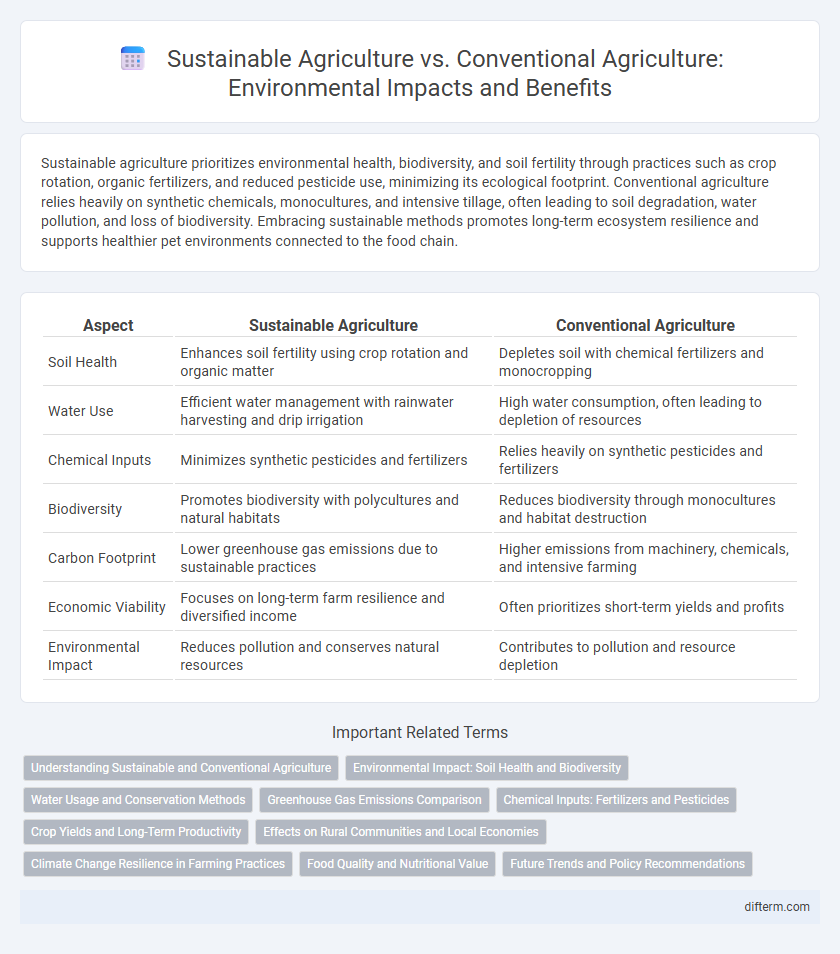Sustainable agriculture prioritizes environmental health, biodiversity, and soil fertility through practices such as crop rotation, organic fertilizers, and reduced pesticide use, minimizing its ecological footprint. Conventional agriculture relies heavily on synthetic chemicals, monocultures, and intensive tillage, often leading to soil degradation, water pollution, and loss of biodiversity. Embracing sustainable methods promotes long-term ecosystem resilience and supports healthier pet environments connected to the food chain.
Table of Comparison
| Aspect | Sustainable Agriculture | Conventional Agriculture |
|---|---|---|
| Soil Health | Enhances soil fertility using crop rotation and organic matter | Depletes soil with chemical fertilizers and monocropping |
| Water Use | Efficient water management with rainwater harvesting and drip irrigation | High water consumption, often leading to depletion of resources |
| Chemical Inputs | Minimizes synthetic pesticides and fertilizers | Relies heavily on synthetic pesticides and fertilizers |
| Biodiversity | Promotes biodiversity with polycultures and natural habitats | Reduces biodiversity through monocultures and habitat destruction |
| Carbon Footprint | Lower greenhouse gas emissions due to sustainable practices | Higher emissions from machinery, chemicals, and intensive farming |
| Economic Viability | Focuses on long-term farm resilience and diversified income | Often prioritizes short-term yields and profits |
| Environmental Impact | Reduces pollution and conserves natural resources | Contributes to pollution and resource depletion |
Understanding Sustainable and Conventional Agriculture
Sustainable agriculture employs eco-friendly practices such as crop rotation, organic fertilization, and integrated pest management to maintain soil health and reduce environmental impact. Conventional agriculture relies heavily on synthetic fertilizers, pesticides, and monoculture, often leading to soil degradation and biodiversity loss. Understanding the differences in resource use, environmental effects, and long-term productivity between these methods is crucial for promoting food security and ecosystem resilience.
Environmental Impact: Soil Health and Biodiversity
Sustainable agriculture promotes soil health through practices like crop rotation, cover cropping, and reduced chemical use, enhancing nutrient cycling and microbial diversity. In contrast, conventional agriculture often relies on synthetic fertilizers and pesticides, leading to soil degradation, reduced organic matter, and loss of biodiversity. Maintaining biodiversity in sustainable farming supports ecosystem services such as pollination and natural pest control, which are frequently compromised in conventional systems.
Water Usage and Conservation Methods
Sustainable agriculture employs advanced water conservation techniques such as drip irrigation, rainwater harvesting, and soil moisture sensors to significantly reduce water consumption compared to conventional agriculture. Conventional farming often relies on flood irrigation and excessive groundwater extraction, leading to soil erosion and water scarcity. Efficient water management in sustainable systems enhances crop resilience and preserves freshwater resources essential for long-term environmental health.
Greenhouse Gas Emissions Comparison
Sustainable agriculture significantly reduces greenhouse gas emissions compared to conventional agriculture by minimizing synthetic fertilizer use and promoting carbon sequestration through cover cropping and agroforestry. Studies show that sustainable practices can lower emissions by up to 40% per unit of food produced, enhancing soil carbon storage and reducing nitrous oxide release. In contrast, conventional agriculture relies heavily on fossil-fuel-based inputs, contributing to higher levels of methane and carbon dioxide emissions.
Chemical Inputs: Fertilizers and Pesticides
Sustainable agriculture minimizes chemical inputs by using organic fertilizers and natural pest control methods, reducing soil and water contamination. Conventional agriculture relies heavily on synthetic fertilizers and pesticides, which can degrade soil health and increase environmental pollution. The reduced chemical dependency in sustainable practices promotes biodiversity and long-term ecosystem resilience.
Crop Yields and Long-Term Productivity
Sustainable agriculture enhances crop yields by improving soil health through crop rotation, organic fertilizers, and reduced chemical inputs, resulting in increased productivity over time. Conventional agriculture often achieves higher short-term yields using synthetic fertilizers and intensive monocropping but risks long-term soil degradation and decreased fertility. Emphasizing sustainable practices ensures resilient ecosystems that maintain consistent crop production and food security for future generations.
Effects on Rural Communities and Local Economies
Sustainable agriculture enhances rural communities by promoting local job creation through diversified farming practices and supporting small-scale producers, which strengthens local economies. Conventional agriculture often prioritizes large-scale monocultures, leading to reduced employment opportunities and economic disparities in rural areas. The community-centered approach of sustainable farming fosters social cohesion and economic resilience by encouraging local food systems and environmentally friendly practices.
Climate Change Resilience in Farming Practices
Sustainable agriculture enhances climate change resilience by improving soil health, increasing biodiversity, and optimizing water use, which collectively reduce vulnerability to extreme weather events. In contrast, conventional agriculture often relies on monocultures and heavy chemical inputs, leading to soil degradation and reduced adaptive capacity. Practices such as crop rotation, agroforestry, and organic fertilization in sustainable systems strengthen ecosystems and promote carbon sequestration.
Food Quality and Nutritional Value
Sustainable agriculture enhances food quality by promoting soil health and reducing chemical inputs, which leads to higher nutrient density and better taste in crops. In contrast, conventional agriculture often relies on synthetic fertilizers and pesticides that can diminish the nutritional value of food and introduce harmful residues. Studies show that sustainably grown produce contains higher levels of antioxidants, vitamins, and minerals compared to conventionally grown counterparts.
Future Trends and Policy Recommendations
Sustainable agriculture is projected to expand through innovations like precision farming, agroecology, and regenerative practices that enhance soil health and biodiversity while reducing carbon emissions. Future policies should prioritize incentives for carbon sequestration, water conservation, and reduced chemical inputs, alongside stringent regulations on synthetic fertilizers and pesticides to promote environmental resilience. Integrating digital technologies and supporting smallholder farmers in adopting sustainable methods will be critical for scaling eco-friendly food systems globally.
sustainable agriculture vs conventional agriculture Infographic

 difterm.com
difterm.com